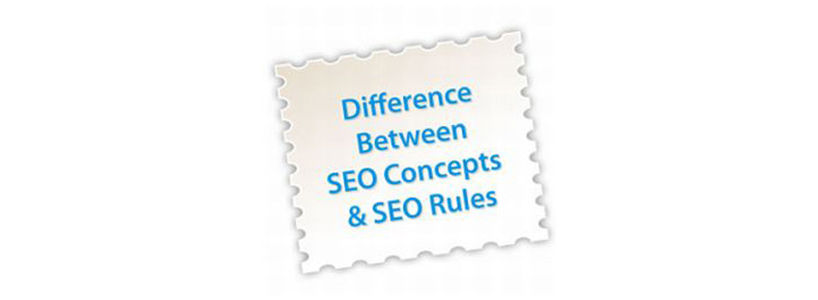Search Engine Optimization has revolutionized the way viewers access the web and the manner in which the content for web is developed. Needless to say, SEO operates on a certain set of concepts and rules that define it and help in its improvement. Today, we will discuss some of these important rules & concepts and what basically separates them. Read on, if you are an online writer, a beginner in SEO or if you just want to know more about this interesting optimization model in a simple way.
SEO Rules
These define the basic pattern on which the optimization of a search engine works conforming to pre-set rules that may or may not be technical like:
Coding
- Incomplete HTML tags, missing tags or tags with no association can cause a problem with SEO Checkers.
- Too short or too long keywords are rejected so make appropriate and relevant keywords.
- Some characters or words have no SEO value e.g. copyright or the symbol. So, avoid these.
- Not more than 150 characters in Image or Alt tag.
There should ideally be one canonical link, one
tag and one tag for description.
- Form proper hyperlinks; the details for this are available in many books and online sites.
- Use attribute value correctly in the nofollow tag to avoid blocking the content.
Content
- Rankings drop for pages that are too large of if they immediately redirects the reader to another page.
- There is nothing worse than duplicate content, which can harm the rankings of all websites that are displaying it.
These are just a few of the numerous rules that underline SEO; you can easily find more on the web. SEO Concepts SEO Concepts depend on various aspects like the correctness of coding and usage of tags, the number of authoritative sites linked to the particular webpage and the frequency of the pages of your website being selected by users from results.
Underlying Notion
- No missing information either in terms of coding or content as it causes problems in the formation of pages and does not make it reader friendly. The Search Bots definitely avoid such websites.
- Keep the webpage unique, in terms of the keywords being used and the content itself. It is sheer common sense- why would a website be ranked higher if it contains something that is already present on the internet?
- Location of search term, its relevance to the page and frequency
- Placement of the Robots.txt file on your website guides the search bots in managing, which pages to consider and which ones to ignore while ranking.
- Crawlers mainly check certain tags in a webpage, which should be properly formed and placed for correct evaluation like: <title>tag, tags for headings & hyperlinks and the <meta name="keywords">tag.
- Content should be keyword rich but avoid the use of placing keywords just for the sake of being detected by the crawlers- it does not work. Many times you can find websites that mention a horde of keywords in a single paragraph or beneath an image but these only spoil the aesthetics of the page while playing havoc with its rankings.
Search Engine Optimization is a process that may take some time but gives valuable results for website owners and internet users. Understanding and implementation of SEO Rules and Concepts is equally necessary to get the edge. We will post more such articles in the future to create better awareness. Happy Optimizing!


4 thoughts on "The Difference between SEO Concepts and SEO Rules"
Make The Logo Bigger
05 November, 2012 at 12:18 pm
Attractive Topic and 100% focus on the topic in the content. Really enjoyed the blog which is full of information as I gained so much from this.
Cancel
Reply
Justin
17 January, 2012 at 7:58 am
Really good publish. I simply discovered your site and needed to say that I have undoubtedly loved browsing your website.
Cancel
Reply
JasonooRider
01 December, 2010 at 6:48 pm
Awesome blog thank you!
Cancel
Reply
madhu
28 September, 2010 at 3:57 pm
Really a good website for the upcoming web designers, web developers who are starting up their career in web industry....thankful to the weblinkindia team....
Cancel
Reply